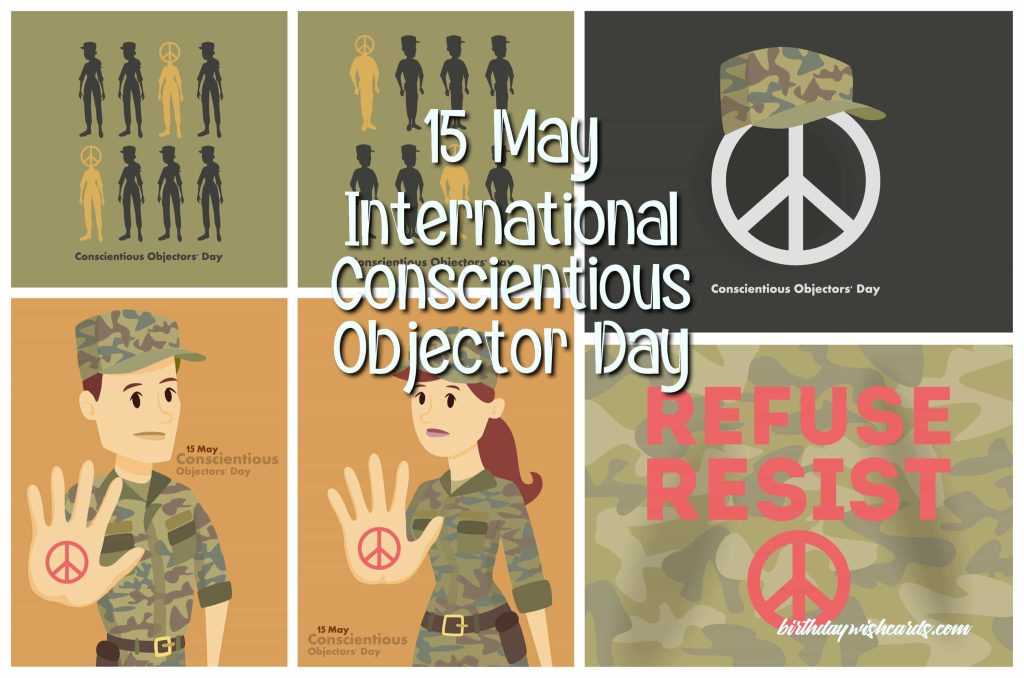
15 May: International Conscientious Objector Day
What Is a Conscientious Objector?
A conscientious objector is someone who asserts the right to refuse military service on the grounds of freedom of conscience or belief. International Conscientious Objector Day, observed annually on May 15, honors those who have chosen—and continue to choose—to say no to war and killing. This day highlights the importance of freedom of conscience within the military context and commemorates individuals who have resisted conscription throughout history.
Worldwide, hundreds of conscientious objectors face imprisonment, persecution, or exile for refusing to join armed forces. On May 15, we stand in solidarity with these individuals and pay tribute to all who have opposed military service on moral or ethical grounds.
The Role of the United Nations
The United Nations has played a pivotal role in affirming the rights of conscientious objectors. On March 8, 1995, the UN Commission on Human Rights adopted decision 1995/83, affirming that “persons performing military service should not be excluded from the right to have conscientious objections to military service.” This landmark decision recognized freedom of conscience as a fundamental human right, even within the military.
Further, UN resolution 1998/77 acknowledged that “persons (already) performing military service may develop conscientious objections.” These resolutions emphasize that conscientious objection is a valid and protected right under international human rights law, including for those already enlisted.
Conscientious Objectors in World War I
Before World War I, Britain had no compulsory military service. This changed in January 1916, when the Military Service Act introduced conscription due to insufficient volunteer enlistment. From March 1916, military service became mandatory for all single men aged 18 to 41 in England, Scotland, and Wales, with exemptions for those in essential war-related occupations, sole providers for dependents, the medically unfit, and notably, those who could demonstrate conscientious objection.
The inclusion of a conscientious objection clause was a significant concession by the British government, helping to ease opposition to conscription. Subsequent amendments expanded conscription to married men, tightened occupational exemptions, and increased the upper age limit to 50.
During World War I, approximately 16,000 British men were officially recorded as conscientious objectors. This number excludes men who held anti-war views but were medically unfit, engaged in reserved occupations, or enlisted despite their beliefs. While small relative to the six million who served in the British armed forces, the impact of conscientious objectors on public opinion, legal precedents, and future policy has been profound and enduring.
Conscientious Objectors in World War II
During World War II, the number of conscientious objectors in Britain remained significant. Over 4,400 men were imprisoned for refusing to enlist. Although their cases were heard, their reasons were often dismissed. Around 7,000 conscientious objectors agreed to perform non-combatant duties, frequently serving as stretcher-bearers on the front lines and providing critical medical support without bearing arms.
More than 1,500 pacifists refused all forms of military service, including non-combatant roles. Many served as medics without carrying weapons, while others contributed on the home front through essential civilian services such as fighting forest fires and participating in conservation projects.

The Importance of International Conscientious Objector Day
International Conscientious Objector Day serves as a global reminder of the courage and moral conviction shown by conscientious objectors throughout history. It draws attention to the ongoing challenges faced by those who refuse military service on ethical, religious, or philosophical grounds, including imprisonment, discrimination, and social ostracism.
This day also raises awareness about the legal protections and human rights frameworks needed to safeguard freedom of conscience worldwide. It encourages governments and international bodies to respect and uphold the rights of conscientious objectors and to provide alternatives to compulsory military service that honor individual beliefs.
Legal Protections and Challenges Today
While international law increasingly recognizes the rights of conscientious objectors, significant challenges remain. Some countries lack clear legal frameworks, leading to the criminalization and persecution of those who refuse military service.
Amnesty International reports that conscientious objectors continue to face imprisonment and harsh treatment in various parts of the world. Human rights organizations advocate for fair procedures to assess claims of conscientious objection and for the availability of alternative civilian service options.
Historical Impact and Legacy
The legacy of conscientious objectors extends far beyond their immediate resistance to military service. Their stance has inspired broader movements for peace, human rights, and social justice. By standing firm in their beliefs, conscientious objectors have challenged militarism and fostered dialogue on ethical alternatives to violence.
Their actions have also contributed to the development of international legal standards protecting freedom of thought, conscience, and religion, as enshrined in the Universal Declaration of Human Rights.
How to Observe International Conscientious Objector Day
- Participate in or organize educational events highlighting the history and significance of conscientious objection.
- Support organizations that advocate for the rights of conscientious objectors worldwide.
- Engage in peaceful actions that promote freedom of conscience and nonviolence.
- Raise awareness through social media campaigns and community discussions.
- Reflect on the importance of respecting individual beliefs and the moral complexities of military service.
Conclusion
International Conscientious Objector Day on May 15 is a vital occasion to honor those who have bravely refused military service on ethical grounds. It underscores the universal right to freedom of conscience and the importance of protecting this right in times of both peace and conflict. The history of conscientious objection—from World Wars I and II to the present day—reveals both the challenges and triumphs of individuals committed to peace and human dignity.
As societies continue to grapple with issues of war, peace, and human rights, the voices of conscientious objectors remain essential. They remind us that moral courage and respect for individual conscience are fundamental to building a more just and peaceful world.




